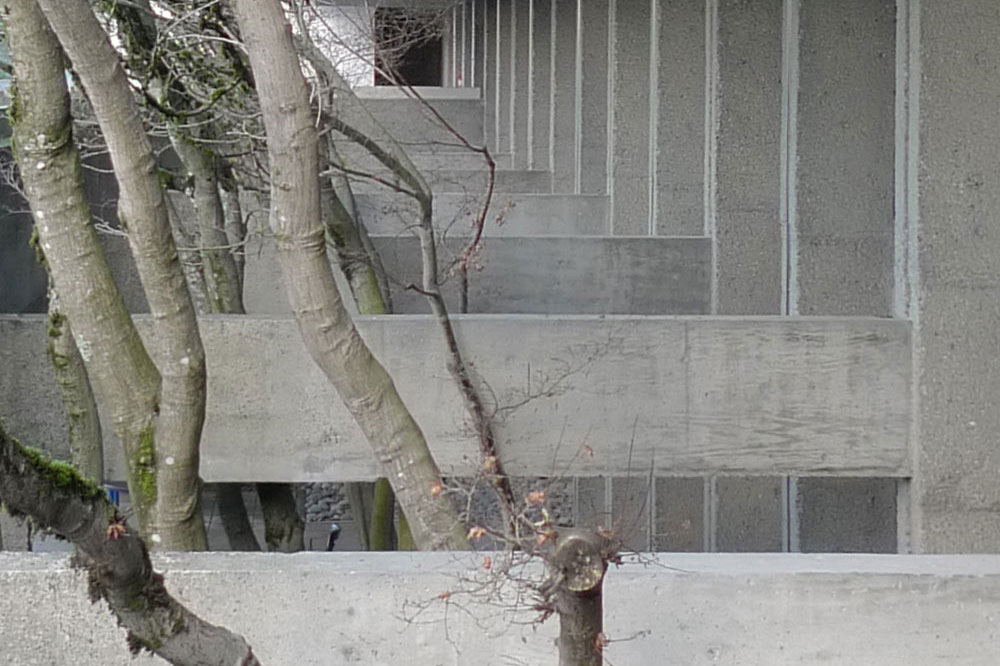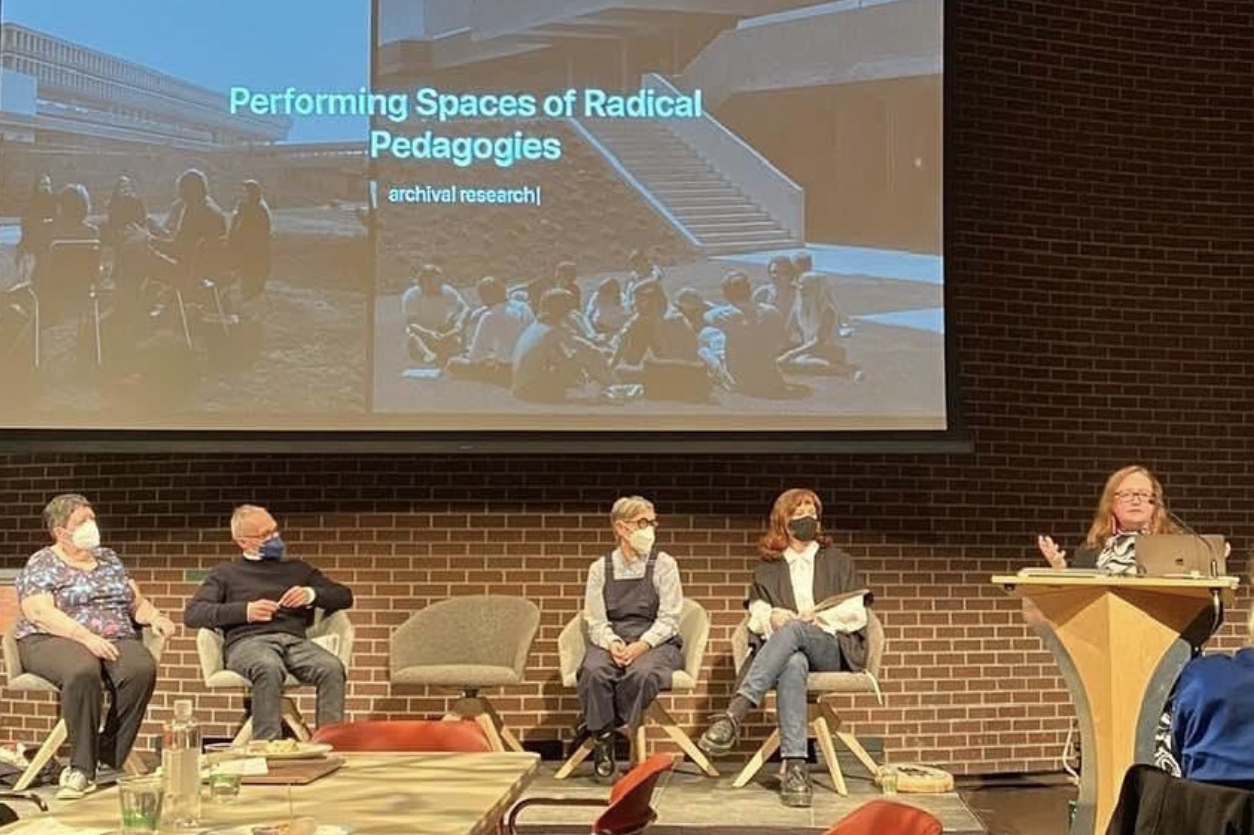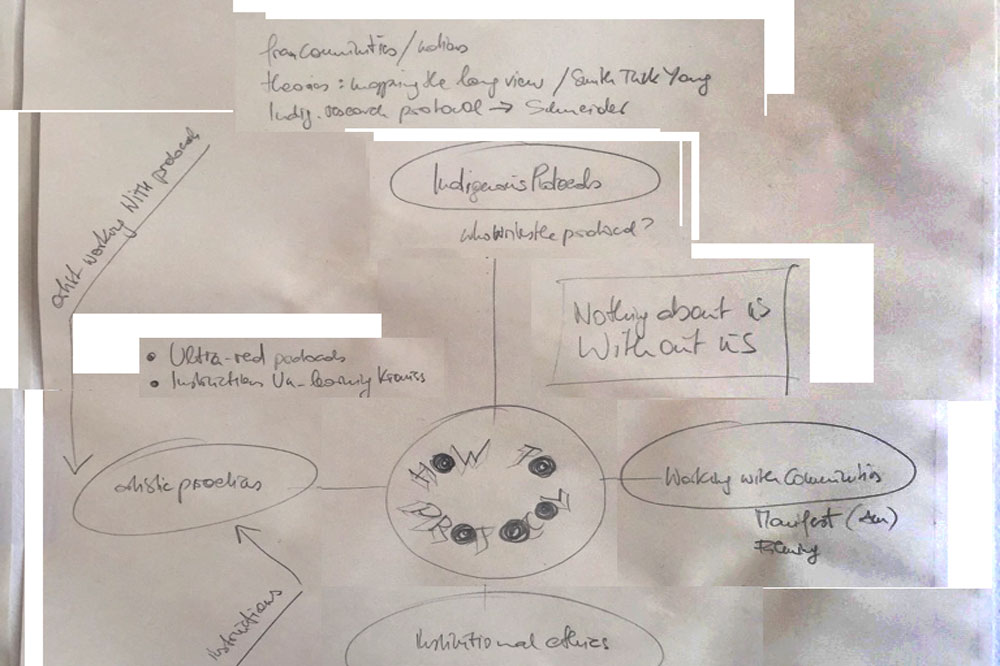Visual material
Lhuḵw’lhuḵw’áyten, “‘where the bark gets pe[e]led’ in spring” is the Skwxwu7mesh (Squamish) place name for the area that was formerly Barnet Mill, and today is known as Barnet Marine Park. It is at the base of Burnaby Mountain, home of Simon Fraser University. In modern usage this name is often used to refer to all of Burnaby Mountain.
The name Lhuḵw’lhuḵw’áyten, derives from the Skwxwu7mesh word for arbutus, lhulhuḵw’ay, which comes from lhuḵw’ (peel), and means “always peeling tree.” For generations, Skwxwu7mesh people have seasonally harvested this tree’s bark, using it for different cultural purposes. It provides important medicine. It can be made into a ‘tea’, which is used as an eyewash, and the leaves can be chewed to treat colds and tuberculosis.
Sḵwx̱wú7mesh people also harvested cedar bark on Burnaby Mountain. Used for spiritual and utilitarian purposes, cedar is one of the most culturally important trees. Bark peeling remains an important prac- tice that continues today throughout Sḵwx̱wú7mesh lands. In the spring, when the tree sap is running, strips of cedar bark are carefully peeled from the trunk in a way that does not damage the tree. Uses of the bark have included basketry, mats, clothing, and rope. In the past, newborn babies were also wrapped and diapered in the softer inner bark.
(The Bill Reid Centre, 2016)
Ongoing updates on events, productions and ressources
participated in Education Shock. Learning, Politics and Architecture in the 1960s and 1970s at HKW Berlin 2021
... Educational Modernism is published with adocs publishing Hamburg and Edition Camera Austria
Guests & Hosts created an installation consisting of a series of photographs, a wallpaper and 3 panels

sound recordings at different places and in dfferent building at the SFU campus are basis for Toni's composition
Whose Land are You on? #2 was set up as a workshop, we printed t-shirts at the convocation mall at SFU

Unsettling Educational Modernsim was presented: introductions, Indigenous food and a sound composition
Whose Land are You on? was the titel of a planned event and workshop at the atrium at SFU Burnaby
articles and books on architecture, Indigeneity, pedagogy which informed our project
informing our research on architecture, archival practice, pedagogy, performance and spatial practice
The project ́s main research site is SFU’s Burnaby campus. Read a short history of it's architecture.

a project about protocols, addressing forms of comittments, agreements and ways to collaborate.
Performing Spaces of Radical Pedagogies is located at the School for the Contemporary Arts at Simon Fraser University in Burnaby, Vancouver, Canada, funded by SSHRC (Social Sciences and Humanities Research Council) Insight Development Grants, Fine arts, research-creation.
The purpose of this research is to examine the edu--architectural legacy and potential of Simon Fraser University’s iconic Arthur Erickson campus by reanimating existing spaces on campus that were first designed to enable radical, or open pedagogy. Firstly, these spaces will be reanimated through the performance of archival material related to the moment of radical pedagogy. Secondly, an enacting of contemporary pedagogies based on Indigenous forms of knowing and teaching currently being realized on the campus, will be developed and tested in an existing space designed for radical pedagogy in Erickson’s plan.
Specifically, the collaboration with Dr. June Scudeler (Metis) will be to stage and document her “kitchen table pedagogy” on campus. The main aim of the project is to analyze spatial and architectural conditions in relation to learning and pedagogy and to develop new spatial strategies and approaches through artistic research and the realization of an artwork. The focus on artistic research methods is central to the project to create collaborative and shared forms of knowledge and to relate it to our experience of architecture as a frame of spatial meaning. To meet the main objectives of the project -- radical pedagogy and the mutual relations between pedagogy and space -- two research methods and stages will be employed to study the effects of spatial and architectural settings:
In addition, interviews will be conducted with Indigenous scholars who have a relationship with Simon Fraser University and are experts in Indigenous pedagogy and ways of knowing. These interviews will be utilized to inform our research and also may be used in academic and artistic publications and public exhibitions. As well we may be conducting workshops with students to explore these topics further.
Vancouver-based artist Sabine Bitter teaches visual art at the School for the Contemporary Arts at Simon Fraser University and she collaborates with Vienna-based artist Helmut Weber on projects addressing cities, architecture, and the politics of representation and of space since 1993. Mainly working in the media of photography and spatial installations their research-oriented practice engages with specific moments and logics of the global-urban change as they take shape in neighborhoods, architecture, and everyday life. Dealing with architecture as a frame for spatial meaning, their ongoing research includes projects like “Educational Modernism” and “Housing the Social”.
In 2004, Sabine Bitter, Jeff Derksen and Helmut Weber have formed the urban research collective Urban Subjects. Recently Urban Subjects curated the exhibition “The Militant Image - Picturing What Is Already Going On” with Camera Austria, Graz, participated in Western Front’s “Urgent Imagination” and in Jayce Salloum’s project ThirstDays. Urban Subjects were artists in residence at the Leuphana Arts Program at the University Lüneburg in 2012/2013 and were artists in residence at the EXPO Milan, 2015.
From 2009 – 2013 Sabine Bitter was the coordinator of the Audain Visual Artist in Residence program and the curator of the Audain Gallery SFU Woodward's, realizing projects with Marjetica Potrč, Raqs Media Collective, Elke Krasny with the Downtown Eastside Women’s Centre, Ricardo Basbaum, Claire Fontaine, Muntadas, amongst others.
Treena is a Métis scholar who has worked as a union organizer, writer, bookseller, and researcher. She has worked on the categorization and digitization of archival materials on projects such as The People and The Text and she has worked with the Indigenous Voices Awards and the Indigenous Literary Studies Association.
She is an International Studies student at SFU who brings her experience as a mature student and her Métis background into her studies of nationhood and identity. Treena’s past experience as a co-curator and organizer of the Robson Reading Series and work in the bookselling industry helps to inform her varied contributions to her work on The People and the Text project at SFU.
In 2018 Treena’s work “Hair Raizing”, was shortlisted for Unpublished Prose Piece for the Indigenous Voices Awards and then again in 2020 for her work “Forest Fires and Falling Stars”.
Works by Treena Chambers include:
The Peak, titled “SFU Mural is an UnWarranted Reminder of Canada’s Colonial Past”. (2018)
Rachel Warwick is an interdisciplinary artist, collaborator, and organizer. Her practice is research orientated focused spatial relations and social practice. Rachel is based in Vancouver/unceded territories of the Sḵwx̱wú7mesh (Squamish), Səl̓ílwətaʔ/Selilwitulh (Tsleil-Waututh) and xʷməθkʷəy̓əm (Musqueam) Nations. She has a BFA from Simon Fraser Univeristy and is the recipient of the 2019 Audain Travel Award.
Her recent work Making Friends (In Theory) develops from an archival research-orientated project focused on publication and reading into an ongoing series of relational groups. The work functions through the interaction of three components. First, the supporting structure, a collapsible table, the scene in which table pedagogy emerges. Secondly, the publications, consisting of research on Vancouver’s feminist bookstores, the Kootenay School of Writing, an interview with Lisa Robertson (poet, writer and former proprietor of Proprioception books), an instruction manual, and a questionnaire. Ultimately, Making Friends (In Theory) is a space created amongst a group of people who construct, develop, and deliberate on the group’s design and operation. These relational groups do not focus on a singular end outcome, but a continuous exploration into a multitude of interests. The work’s mobility creates symbiotic relations with its hosts. It is not mutually exclusive to the institution of home, the commercial space, or the gallery. Its structure takes what is offered and suggests a performance.
Toni-Leah C. Yake (European, Kanien’kehá:ka and Haudenessaunee - Turtle Clan) is a composer and artist currently residing on the unceded, traditional, and occupied territories of the xʷməθkʷəy̓əm, Sḵwx̱wú7mesh, and Sel̓íl̓witulh Nations. Her work aims to explore Indigenity, history, blood memory, trauma, and healing. They are a student in the department of Indigenous Studies at Simon Fraser University, and a student of composition in the Music Department of Simon Fraser Universities School Of Contemporary Arts.
She is an Assistant Professor in the Department of Indigenous Studies, cross-appointed with the Department of Gender, Sexuality, and Women’s Studies. Dr. June Scudeler (Métis) received her B.A. and M.A. in English at SFU and her PhD in English from UBC. She is the co-Chair of the Vancouver Indigenous Media Art Festival society and a co-editor of Studies in American Indian Literatures. Her research examines the intersections between queer Indigenous studies, Indigenous literature, film, and art. She has published articles in Native American and Indigenous Studies, American Indian Culture and Research Journal, Canadian Literature, and Studies in Canadian Literature. Her chapters are included in Queer Indigenous Studies: Critical Interventions in Theory, Politics and Literature (University of Arizona Press), and Performing Indigeneity (Playwrights Canada Press).
She is currently researching Indigenous representation in Fear the Walking Dead and Indigenous horror and science fiction literature and film, and writing a proposal for a book about Swampy Cree artist Kent Monkman.
In 2018 her project, "Indigenous Film and Resurgence" explores how the representation of Indigenous people is prevalent in non-Indigenous film and television. The project focuses on screening works by Indigenous artists that have been created over the past three decades to better control or counter such depictions as acts of resurgence. This project is one of the first incidents where Scudeler has staged ‘kitchen table pedagogy’ on campus. The idea of ‘kitchen table pedagogy’ is about a learning environment where people share their stories. “Indigenous Film and Resurgence,” activates this with soup and conversation.
Helmut Weber (collaborator) lives and works in Vienna, Austria. His thirty years of artistic practice is based on project and research oriented works. Trained as a visual artist with a particular focus on architecture and urban space, his experience in contemporary art is driven by a critical engagement in politics of space and questions of representation.
Weber has been collaborating with Sabine Bitter since 1994. In 2004, they formed the urban research collective Urban Subjects with Canadian writer Jeff Derksen.
Based on Bitter & Weber´s long term collaborative practice, Weber´s role will be to participate in the research, join site visits, offer feedback and advice to student researchers from an artistic perspective, and collaborate on the conceptualization of performances and the production of videoworks, as well as research publications.
Specifically, Weber will focus on research of related European models of radical pedagogies as well as artistic practices that incorporate educational contexts in contemporary artworks.
More information on recent works and projects:
www.lot.at
Hannah Campbell is a photographer who focuses on themes of shared experience, collective memories, and storytelling. Hannah is based in Vancouver/unceded territories of the Sḵwx̱wú7mesh (Squamish), Səl̓ílwətaʔ/Selilwitulh (Tsleil-Waututh) and xʷməθkʷəy̓əm (Musqueam) Nations. Hannah holds a BFA from Emily Carr University of Art + Design and is currently completing an MFA at Simon Fraser University. She has received multiple awards for her work, including a Canon Photography Award and most recently a SSHRC research fellowship. Hannah has been chosen to attend international artist in residencies including the Arctic Circle Residency. Hannah uses art as a medium to share stories and create collective experiences between strangers. She seeks to create a narrative of untold stories of the everyday.
Hannah’s most recent projects include: We’ll Walk Together (2019), a book project which explores a park in North Vancouver where here uncle died as a child, utilizing both medium format photography, interviews and archival photographs and documents she weaves together a memorial piece and a study of place through investigating the remembrance held in the park.
Olfa and Sun (2019), is a multi-disciplinary piece combining text, drawing, projection and photography. This piece was later revised to include a sound score written by Hannah. The piece explores the unfolding of an interaction between herself and a stranger and how a moment that sits between danger and sadness suspends the distance often felt between strangers. This work explores how we come back to moments like this and they take shape within our lives.
Ashes and The Sea (2020) is a collaborative project between herself and Xinyue Liu which imagines the movement of ashes dispersed in the sea as a dance. Utilizing photography and text as a process to explore movement, the body and the ocean in relations with each other.
In spring 2020 the research group called Guests & Hosts was formed by Sabine Bitter, Hannah Campbell, Treena Chambers, June Scudeler, Rachel Warwick, Helmut Weber, and Toni-Leah Yake on the occasion of the invitation to participate in the exhibition Education Shock. Learning, Politics and Architecture in the 1960s and 1970s, April – July 2021 at HKW (Haus der Kulturen der Welt) Berlin, curated by Tom Holert.
Collaboratively the group developed and realized the photographic work Unsettler Space (2020) and published the artists book Unsettling Educational Modernism. Simon Fraser University, Burnaby, Vancouver (2021).